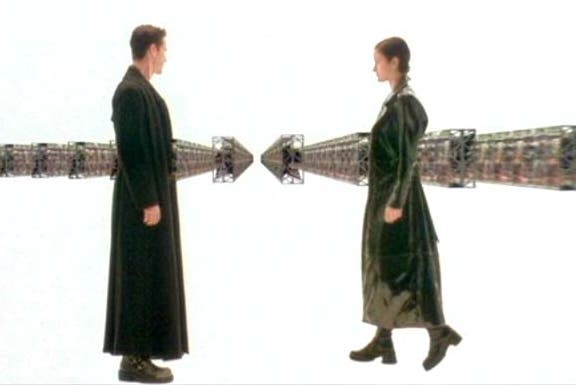"In a few years we'll be able to get Matrix level virtual reality"
Oculus founder predicts bright future as Android support looms and consoles remain a possibility.
Oculus Rift, the virtual reality headset that's taken the world by storm, is working towards supporting Android platforms, and while there's no real word on whether it'll be compatible with consoles by the time of its projected release towards the end of next year it remains a possibility - and the future for virtual reality technology could soon take us to startling places.
"Android's not necessarily the next platform, it's just one we've been working on for a while," Oculus' founder Palmer Luckey told Eurogamer at GDC Europe. "The reason we chose Android is because, well, what are the other options? There's iOS where you can't plug anything into their systems, and Windows Phone where there's not much out there. We'd love to support it, but there's not much to look into - we know it could work, but the business side isn't there."
As for console versions, while Oculus is open to admit that talks have taken place with Microsoft and Sony there's nothing new to share. "They're a little busy," said Laird Malamed. "We've chatted, but they're trying to bring their new consoles out. It's a possibility - it would work. It's the same thing as iOS - it could technically work, but the business side isn't there."
The simplicity of the Rift device, which has shifted 20,000 dev units since they became available earlier this year, means there are few barriers to getting the headset up and running on console. "From our point of view you just need an HDMI input, and both consoles have HDMI," said Malamed. "My experience has been that to get access to the USB side, that's typically where you need software level support and that's where you need their help."
There's also the strong possibility that Microsoft and Sony are prepping their own headsets to accompany the Xbox One and PlayStation 4 as Oculus paves the way for a new generation of virtual reality. Such an outcome would be welcomed by Malamed.
"They're big companies with lots of resources. For us we'd say good. With John Carmack coming over as our CTO, we've had a great Kickstarter campaign, they continue to be great supporters, but we're still a start-up. VR's had a lot of failures in the past, and so the more people that enter the market is good because developers that ultimately have to develop the content, they know they'll have people playing their games which is better for all of us."
Oculus has used Gamescom and GDC Europe to announce Oculus Share, a demo platform that pools together the various experiments that have been created for the headset. Many of them prove that Oculus Rift doesn't work exclusively with first person games - during a GDC keynote Luckey spoke of playing football games using the device, an experience he dubbed 'TelepaFIFA' as you took control of players while having the sensation of sitting in the stands.
Oculus Rift remains on course to release towards the end of next year, and Luckey predicts a bright future for the technology. "VR tech today is still very crude, but it's advancing rapidly," he said. "I think in a few years, maybe a few decades depending on how lucky we are, we'll be able to get Matrix level virtual reality."

